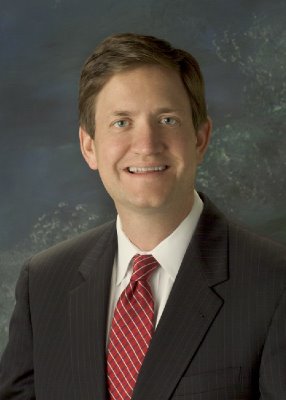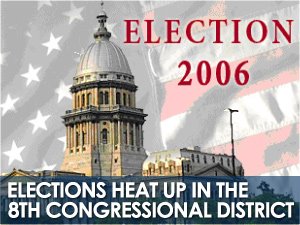Things Heat Up in the 8th Congressional District
Things Heat up In the 8th Congressional District
By Erin Hartnett
With just over a month until Election Day (November 7, 2006), congressional campaigns have gone into overdrive with their fundraising efforts while spending the big bucks. At the forefront of this extreme cash flow is Illinois’ very own 8th Congressional District. Although the House of Representatives seat is currently held by first-term Democrat Melissa Bean, the Republican Party is sparing no efforts in having its candidate of choice, David McSweeney reclaim a district it held for the three decades prior to 2004. But what is an election without an independent running? Alongside Bean and McSweeney is independent Moderate candidate Bill Scheurer.
CANDIDATE PROFILES

Melissa Bean
First elected in 2004, Representative Melissa Bean considers herself a moderate Democrat, often voting against party lines. Although she has gained immense support from the business community (most recently endorsed by the U.S. Chamber of Commerce), the Congresswoman’s vote in favor of the 2005 CAFTA Implementation Bill isolated her labor constituents (a group that largely contributed to her success in 2004).
Although she has not received a number of her previous union endorsements many have withheld their condemnations—in an attempt to keep the seat Democratic. Unopposed in the primary, Bean had $1.75 million left from 2004 to jumpstart her fundraising efforts, along with the backing of DCCC Chairman Rahm Emanuel (IL-5).

David McSweeney
This is investment banker David McSweeney’s second attempt at the seat (he ran in 1998), and his political experience includes five years as a Palatine Township Trustee (1995-2000) and an internship with the Reagan-Bush Campaign (1984). He won March’s 6-way Republican primary, but at a great cost—spending almost $1.7 million of his own money for the nomination.
Although largely self-financed, McSweeney has gotten a substantial hand from many of the Republican Party’s heavy-hitters, with fundraising appearances from Vice President Dick Cheney, Speaker of the House Dennis Hastert, former New York City Mayor Rudy Guiliani, and Arizona Senator (and likely 2008 presidential candidate) John McCain.

Bill Scheurer
Running as a Moderate is entrepreneur Bill Scheurer. Despite running for a State House seat in 2004, he lacks political experience (he was previously an attorney and a CEO).
With two children serving in the military, Scheurer has focused his attention upon the war in Iraq, calling for troop withdrawal and increased benefits for members of the armed forces. He has received endorsements from a number of unions, including the Teamsters, Unite Here, and the Service Employees International Union. His candidacy has been welcomed by McSweeney (who invited Scheurer to take part in all three of the debates), as he has the potential to divert needed support from Bean’s liberal base.
KEY ISSUES
Both Bean and McSweeney have embraced controversial views on current hot-button issues such as immigration and national security, while Scheurer has taken a more ‘liberal’ position.
While in office, Bean voted in favor of the Secure Fence Act of 2006 (HR 6061), Border Security Bill (HR 4437), and Real ID Act of 2005 (HR 418), all against her party’s position. She also voted in favor of the Patriot Act Reauthorization bill, which was strongly opposed by Democrats.
McSweeney has supported an increase in caps for legal immigration, but staunchly opposes a path to citizenship for undocumented immigrants. Specifically, he has voiced support for the Sensenbrenner bill but feels that there should be exemptions made for religious organizations.
Scheurer supports a guest worker program, along with citizenship tracked opportunities for undocumented immigrants. He has opposed the Real ID Act and the Sensenbrenner bill, but supports efforts to make hiring an illegal immigrant a felony.











